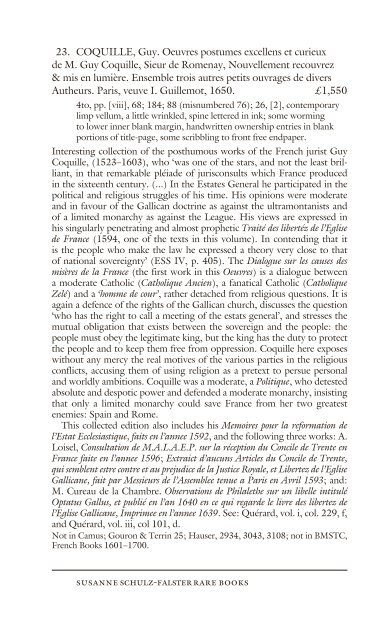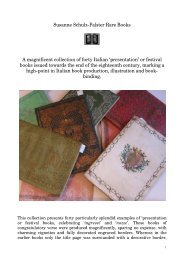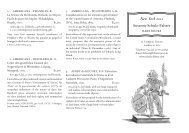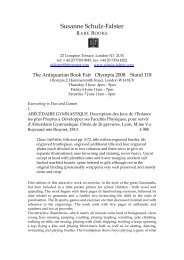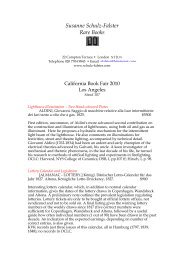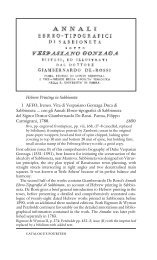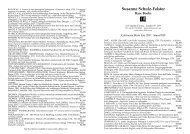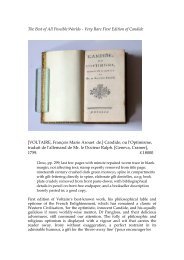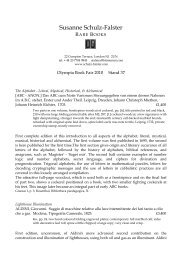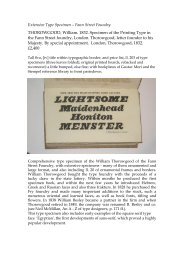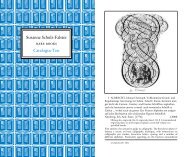Susanne Schulz-Falster Catalogue Eighteen - International League ...
Susanne Schulz-Falster Catalogue Eighteen - International League ...
Susanne Schulz-Falster Catalogue Eighteen - International League ...
You also want an ePaper? Increase the reach of your titles
YUMPU automatically turns print PDFs into web optimized ePapers that Google loves.
23. COQUILLE, Guy. Oeuvres postumes excellens et curieux<br />
de M. Guy Coquille, Sieur de Romenay, Nouvellement recouvrez<br />
& mis en lumière. Ensemble trois autres petits ouvrages de divers<br />
Autheurs. Paris, veuve I. Guillemot, 1650. £1,550<br />
4to, pp. [viii], 68; 184; 88 (misnumbered 76); 26, [2], contemporary<br />
limp vellum, a little wrinkled, spine lettered in ink; some worming<br />
to lower inner blank margin, handwritten ownership entries in blank<br />
portions of title-page, some scribbling to front free endpaper.<br />
Interesting collection of the posthumous works of the French jurist Guy<br />
Coquille, (1523–1603), who ‘was one of the stars, and not the least brilliant,<br />
in that remarkable pléiade of jurisconsults which France produced<br />
in the sixteenth century. (...) In the Estates General he participated in the<br />
political and religious struggles of his time. His opinions were moderate<br />
and in favour of the Gallican doctrine as against the ultramontanists and<br />
of a limited monarchy as against the <strong>League</strong>. His views are expressed in<br />
his singularly penetrating and almost prophetic Traité des libertéz de l’Eglise<br />
de France (1594, one of the texts in this volume). In contending that it<br />
is the people who make the law he expressed a theory very close to that<br />
of national sovereignty’ (ESS IV, p. 405). The Dialogue sur les causes des<br />
misères de la France (the first work in this Oeuvres) is a dialogue between<br />
a moderate Catholic (Catholique Ancien), a fanatical Catholic (Catholique<br />
Zelé) and a ‘homme de cour’, rather detached from religious questions. It is<br />
again a defence of the rights of the Gallican church, discusses the question<br />
‘who has the right to call a meeting of the estats general’, and stresses the<br />
mutual obligation that exists between the sovereign and the people: the<br />
people must obey the legitimate king, but the king has the duty to protect<br />
the people and to keep them free from oppression. Coquille here exposes<br />
without any mercy the real motives of the various parties in the religious<br />
conflicts, accusing them of using religion as a pretext to persue personal<br />
and worldly ambitions. Coquille was a moderate, a Politique, who detested<br />
absolute and despotic power and defended a moderate monarchy, insisting<br />
that only a limited monarchy could save France from her two greatest<br />
enemies: Spain and Rome.<br />
This collected edition also includes his Memoires pour la reformation de<br />
l’Estat Ecclesiastique, faits en l’annee 1592, and the following three works: A.<br />
Loisel, Consultation de M.A.L.A.E.P. sur la réception du Concile de Trente en<br />
France faite en l’annee 1596; Extraict d’aucuns Articles du Concile de Trente,<br />
qui semblent estre contre et au prejudice de la Justice Royale, et Libertez de l’Eglise<br />
Gallicane, fait par Messieurs de l’Assemblee tenue a Paris en Avril 1593; and:<br />
M. Cureau de la Chambre. Observations de Philalethe sur un libelle intitulé<br />
Optatus Gallus, et publié en l’an 1640 en ce qui regarde le livre des libertez de<br />
l’Eglise Gallicane, Imprimee en l’annee 1639. See: Quérard, vol. i, col. 229, f,<br />
and Quérard, vol. iii, col 101, d.<br />
Not in Camus; Gouron & Terrin 25; Hauser, 2934, 3043, 3108; not in BMSTC,<br />
French Books 1601–1700.<br />
The Leaning Towers of Bologna<br />
susanne schulz-falster rare books catalogue eighteen<br />
24. DALL’AJA, Martino. Il comento di ser Martino dall’Aja. Nel<br />
quale spiegasi a Donna Berta dal Mulino un libretto, che venne alla<br />
luce l’anno 1792 con l’aggiunta di un dialogo fra uno stampatore, ed<br />
un poetuzzo. Dedicato alla sublime, ed eccelsa Torre degli Asinelli.<br />
Venice, Antonio Curti, 1799. £550<br />
Tall 8vo, engraved frontispiece, pp. [viii], 9–108, [1] privilege,<br />
[3] blank, including initial blank; uncut in contemporary blue stiff<br />
wrappers; early reback.<br />
First edition of a fine light-hearted essay on the beauty and size of the<br />
Two Towers of Bologna. The towers, the Asinelli and the Garisenda are<br />
both of them leaning, and are the symbol of the city. The fine engraved<br />
frontispiece shows the two towering over the clock tower of San Marco’s<br />
in Venice, the leaning tower of Pisa and the cathedral of Modena. The work<br />
was apparently first published on the occasion of a wedding in 1792 and<br />
dedicated to the mother of the bridegroom.<br />
Particularly appealing is the second half, which contains a dialogue<br />
between a bad poet and his printer. The poet complains about the difficulty<br />
of expressing his high emotions, the printer gives welcome advice.<br />
Morazzoni, p. 223; uncommon, OCLC: Harvard.


